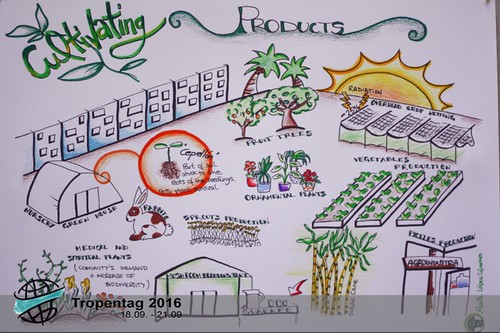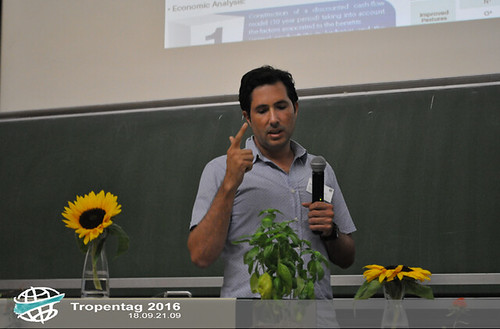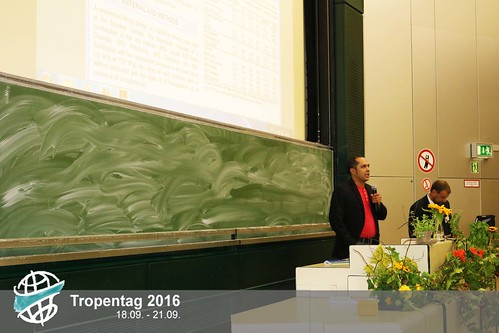Tropentag 2016
Today's highlights from maize fertilisers and standard management of monocultures
Tue, 09/20/2016 - 15:37 — BackhausIf yesterday was the day for BIOCHAR, today’s topic of the sessions about soil fertility and nutrient management was MAIZE. From strategies to outbalance nutrient insufficiencies for maize production in Kenya, to fertiliser optimisation under weed competition and the economic analysis of maize production, many aspects have been covered.
Jacobo Arango and Stefan Burkart presented their researches about Brachiaria Humidicola.
Godfrey Nambafu summed up his results about the strategies adopted by African indigenous plants to cope with phosphorus deficient soils.
Personally, I really enjoyed Patrick van Damme’s research results about Sesbania Rostrata, which used to grow on abandoned rice fields and can be cropped and then plowed into the soil in alternation with rice thanks to its beneficial effect through nitrogen fixation.
Later on, I went to the first oral presentation about the same subject and attended Enos Onyuka talking about the organic carbon input into the soil by plant residues of African indigenous plants. He also stressed the potential for increasing the organic carbon availability in AIV by the use of appropriate harvesting techniques.
Urban agriculture for more resilience in food security
Tue, 09/20/2016 - 15:09 — BergerDo you know the image of Fidel Castro "smoking" a carrot with the caption „organic by default“? This is pretty much the case of Cuban urban farming practices. When the Soviet block collapsed, farmers were forced to turn to sustainable practices due to a lack of external energy-intensive inputs. At the same time, cities had a need for locally produced food. Today, the city of Havana produces 80 percent of its fruit and vegetable demand within the town borders!
The following picture shows a project by Marta Lopéz Cifuentes, student at BOKU, which is displayed in the registration area.

Today, several events at the Tropentag covered the topic of urban agriculture as a means of enhancing food security (and maybe food sovereignty, too). Cuba is a showcase of urban agriculture, since it has relied on it for several decades already. The government has supported urban agriculture in order to become more independent from imports while farmers appreciated their independence from the state. Surprisingly, despite these two contradictory objectives, policies helped urban producers get access to land, markets and extension services, as the research of Friedrich Leitgeb showed.
Challenges to mobile dryland pastoralists
Tue, 09/20/2016 - 14:27 — BackhausIs it the timing? Am I just choosing the unpopular topics? Is the air-conditioning too cold? I think it is. Or is it common that the audiences at poster sessions are usually rather scarce? In occasion of the poster session about Mobile Dryland Pastoralism (2.2, Tuesday 20th, 9:45 am), I found it especially regrettable that not many people attended. So, I decided to highlight some of my favourite topics of today’s poster session 2.2.
Jenny Bischofberger, for example, presented an interesting poster about the integration of stakeholder's knowledge in land-use management in Namibia, based on interviews analyzing their perception about what is most important to save from degradation in the savannah.
I also appreciated Cornelia Heine’s presentation based on a survey about enabling environment and policies related to pastoralism in 26 countries in Asia, Africa, and Latin America, analyzing pastoralist’s livelihoods.
Learning Crop Production Systems from Around the World
Tue, 09/20/2016 - 14:26 — FadliMany different cropping systems practices have been presented at today's Poster Session, and they come from all around the world. Directly from the University of Basel, for example, Schütz Lukas talked about the application of microbial inoculants as a promising science for sustainable agriculture. She found biofertiliser's use to be a viable technology to be applied in tropical and subtropical soil.

The benefits of bee-pollination on cash crop in Burkina Faso, then, was presented by Katharina Stein, from the University of Wuerzburg in Germany. “So far - she said - there is no report on contribution of bee pollination for crop yield of these crops in Burkina Faso”. In fact, her research shows well how bee-pollination can increase cotton fiber weight by 62% and can just triple the weight of sesame seeds. These numbers are a scientific proof that gratis pollination service by bees can be beneficial for small farmers and stakeholders. Too obvious to remind that natural savannah habitat in Burkina Faso would better be conserved?
Crop Biotic stresses oral presentation session: bio-control of pests and diseases
Tue, 09/20/2016 - 14:20 — KootloleHuman resource is one of the most limited resources – Dr. Poonpipope Kasemsap said
Tue, 09/20/2016 - 12:13 — QuagliaAfter his keynote speech at Tropentag 2016, Dr. Poonpipope Kasemsap from Kasetsart University, Thailand had a short discussion with student reporters about his idea of food security and fair use of resources. Dr. Poonpipope Kasemsap stressed that food security will be one of the most urgent issues in the next few decades. Solving this issue requires the constant solidarity and sharing knowledge between the northern and southern globe, from the developed and developing countries. Since humans are the key actors in finding solutions for food security problems, he believes humans are one of the most limited resources that we need to “renew”.
The initiative from the Horticulture Innovation Lab where Dr. Poonpipope Kasemsap is the director is bringing experts and their knowledge to developing countries to improve the situations there. On the other hand, dealing with problems will also enable these experts to enrich the experience and knowledge.
Dr. Poonpipope Kasemsap is also the responsible person for developing the unique master’s degree program “Food Security and Climate Change”, with cooperation between a group of universities from Europe and Asia. The aim of this program is to build a highly qualified human resource to address the issue of food security and climate change in the future.
Interview: „Solidarity must become a subject of research!“
Tue, 09/20/2016 - 12:10 — BergerTropentag is a research symposium, where the aspect of results' implementation into practice is a priority. During Monday's keynote speeches, the debate about the role of research in fostering solidarity was taken up. Michael Hauser believes research can do a lot to improve solidarity. And yet, according to him, there is a lack of attention on solidarity itself: „Solidarity as such must become a subject of research“, he stated. As an example of solidarity research, he suggested to investigate on how to develop an economy of solidarity.
Tropentag can contribute to promoting solidarity in a competing world. Dr. Hauser encouraged scientists: „We should carefully rethink our research strategies: maintain what has worked with regard to solidarity, but also reexamine those research questions and strategies that haven´t worked. We will have to ask a complete new set of research questions“!
Tuesday's Rice Session
Tue, 09/20/2016 - 11:49 — ElsbyTuesday morning’s poster sessions included informative presentations on one of the world’s most important crops: rice! As a Canadian, I know very little about rice, so I was either the worst person for this reporting job, or the best (as I had a lot to learn!).
A few common presentation themes included nutrient management, tillage practices, and water conservation. Most of the research projects took place in African and Asian countries, but Colombia also made an appearance. It seemed it could be agreed upon that there is a need for innovative water management strategies, cover cropping systems, and an increase in knowledge of nutrient cycling.
Nitrogen topics were recurring throughout the session, including a particularly interesting presentation that informed the audience of the horizontal movement of nitrogen in valley growing regions. It was said that as the year’s first spring rains land on the soil, microorganisms are essentially “woken up”, and an unused surge in microbial activity and thus nutrient availability occurs. With no crop planted in the field during this time, many nutrients are lost in the spring rains and runoff. Cover crops could help to mitigate this effect.





